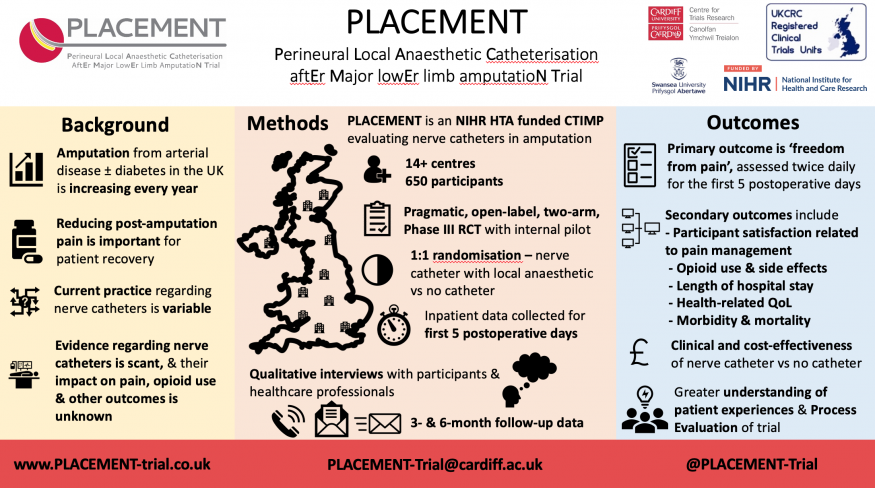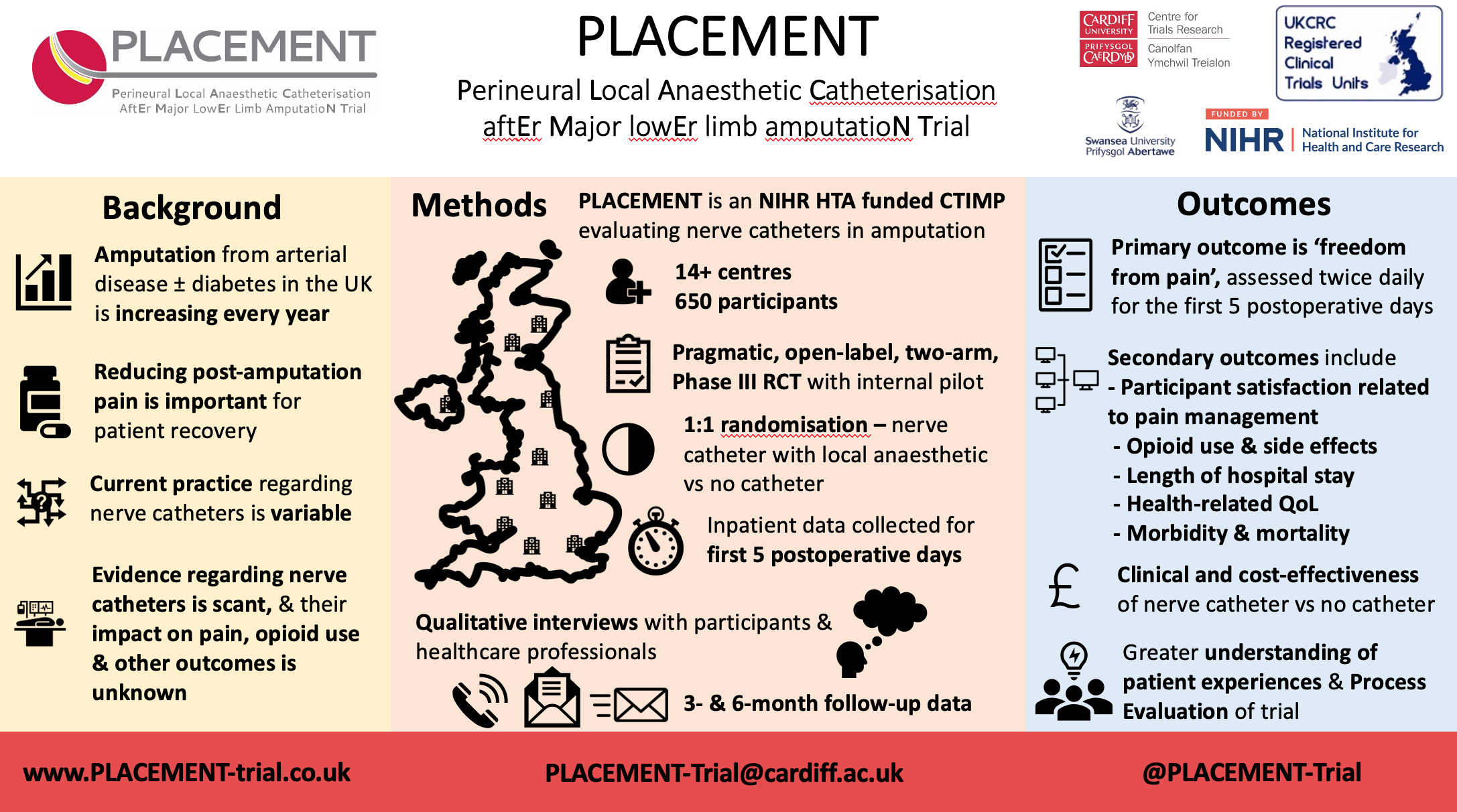Limb Loss and Limb Difference Awareness Month 2024
27 March 2024
-By Sarah Milosevic and Grace Young
April is Limb Loss and Limb Difference Awareness month. Losing a limb is a life-changing event. The number of people undergoing leg amputation surgery in the UK has risen from 3,260 in 2019 to 3,430 in 20221. This increase in the number of leg amputations performed has been highlighted as a cause for concern, given the impact that the loss of a limb has on patient well-being1. Management of pain after leg amputation surgery can impact patient recovery, including their quality of life2,3. Therefore, good pain management is important for favourable short- and long-term patient outcomes, including satisfaction with care, rehabilitation potential, and quality of life following leg amputation surgery4.

The Perineural Local Anaesthetic Catheter After Major Lower Limb Amputation Trial (PLACEMENT) has been designed for people undergoing leg amputation surgery with the help of our Patient and Public Involvement (PPI) Representatives. At the time of their leg amputation surgery, participants will be randomised to receive a perineural nerve catheter (PNC) or not receive a PNC. All participants will receive other pain management as needed. A PNC is a thin plastic tube, placed next to the main leg nerve which is dissected during amputation surgery. Participants randomised to have the PNC placed will have a local anaesthetic infused through the PNC for the first five days after leg amputation surgery. PLACEMENT will evaluate if the use of a PNC with local anaesthetic infusion affects the amount of pain participants experience compared to no PNC, and assess the effect of PNC use on participant satisfaction of pain management, and their recovery at 3 and 6 months, including chronic pain and quality of life. A sample of PLACEMENT participants will also be invited to be interviewed by our Qualitative Researchers. This will help us find out about their experiences of recovery following amputation (including the support they had or would have found useful), experiences of taking part in the PLACEMENT trial and experiences of and preferences for different methods of pain control.
Since opening for recruitment in October 2023, an advisory group of PPI members has been formed. The PLACEMENT PPI Advisory Group met for the first time in February 2024, attended by six people with lived experience of amputation. Group members provided constructive feedback on questions for the trial patient interviews. Resulting improvements to the interview guide included simplifying questions relating to pain relief and adding questions about support and information following amputation. Information about life after amputation was highlighted as a key issue, and group members are keen to create an information resource for new amputees. After the meeting, the attendees of the first advisory group provided their feedback via an anonymous online questionnaire:
- The majority of the group felt that PLACEMENT had or would change based on their suggestions and input
- Group members felt that PLACEMENT was well-balanced in considering the needs of both researchers and patients
- Group members felt that all voices were listened to and debate was encouraged
- Group members felt that all comments were listened to and acted upon
The group will meet a further three times throughout the trial, and are looking for one or two additional members. If you know anyone who might be interested, please contact PLACEMENT PPI Lead Sarah Milosevic at MilosevicS@cardiff.ac.uk.
PLACEMENT update
As of 22nd March 2024, 42 participants have been randomised from 6 active sites in Cardiff, Bristol, Swansea, London, Leicester, and Hull. The next sites to open will be in Basildon, Liverpool, Cambridge, and Newcastle upon Tyne. PLACEMENT is still open to new sites in the UK. For more information, email the trial team (placement-trial@cardiff.ac.uk), visit the trial website (https://www.placement-trial.co.uk/) or view the general information video on YouTube:
Resources for new amputees
There are several local and national charities and organisations who provide excellent resources of information for new amputees including:
- Limb Loss & Limb Difference UK https://www.limblosslimbdifference.co.uk
- The Limbless Association https://limbless-association.org/
- Steel Bones https://steelbone.co.uk/
- Finding Your Feet https://findingyourfeet.net/
- Limb Power https://www.limbpower.com/
- The Amputation Foundation https://amputationfoundation.org/
- I Am Possible Foundation https://iampossiblefoundation.co.uk/
- The Douglas Bader Foundation https://www.douglasbaderfoundation.com/
References
- Waton S, Johal A, Li Q, Atkins E, Cromwell DA, Williams R, Harkin DW, Pherwani AD. National Vascular Registry: 2023 State of the Nation Report. London: The Royal College of Surgeons of England, November 2023
- Torbjörnsson E, et al. Health-related quality of life and prosthesis use among patients amputated due to peripheral arterial disease–a one-year follow-up. Disabil Rehabil. 2020;1–9
- Brier MJ, et al. Quality of Relationships with Caregivers, Depression, and Life Satisfaction After Dysvascular Lower Extremity Amputation. Arch Phys Med Rehabil. 2018;99(3):452–8.
- Jackson MA, Simpson KH. Pain after amputation. Contin Educ Anaesthesia, Crit Care Pain. 2004;4(1):20–3.
- December 2025
- October 2025
- June 2025
- May 2025
- April 2025
- March 2025
- February 2025
- December 2024
- November 2024
- October 2024
- September 2024
- July 2024
- June 2024
- May 2024
- April 2024
- March 2024
- December 2023
- November 2023
- September 2023
- July 2023
- June 2023
- April 2023
- March 2023
- February 2023
- December 2022
- November 2022
- October 2022
- September 2022
- August 2022
- July 2022
- June 2022
- May 2022
- April 2022
- March 2022
- February 2022
- January 2022
- November 2021
- September 2021
- July 2021
- June 2021
- May 2021
- March 2021
- February 2021
- December 2020
- November 2020
- September 2020
- August 2020
- July 2020
- January 2020
- December 2019
- October 2019
- September 2019
- July 2019
- June 2019
- May 2019
- April 2019
- February 2019
- December 2018
- November 2018
- October 2018
- September 2018
- August 2018
- July 2018
- June 2018
- May 2018
- April 2018
- March 2018
- December 2017
- October 2017
- August 2017
- July 2017
- June 2017
- May 2017
- April 2017
- March 2017
- February 2017
- January 2017
- December 2016
- October 2016
- August 2016
- June 2016
- April 2016
- March 2016
- February 2016